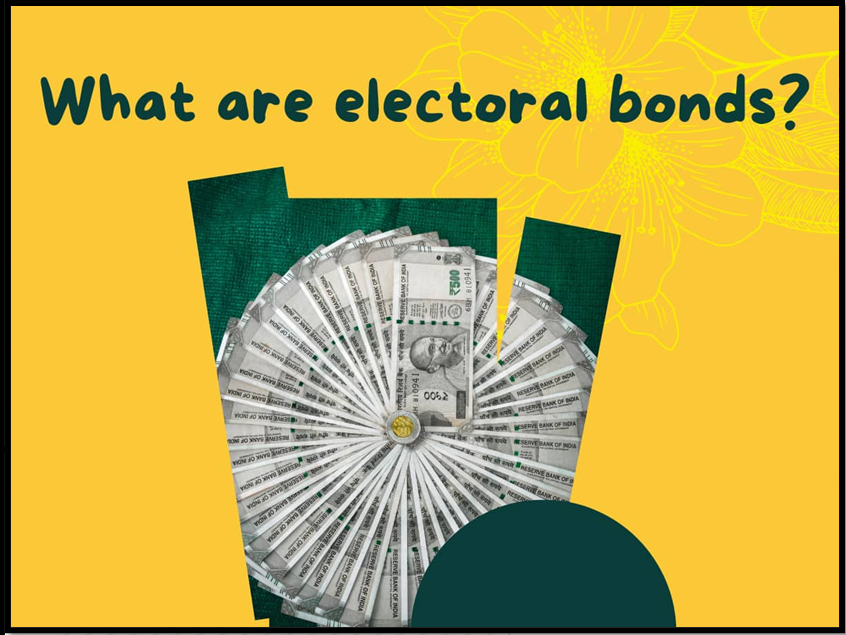INDIA’S VOTERS DESERVE A BOND – OF PROBITY
Syllabus:
GS 2:
- Separation of powers between various organs dispute redressal mechanisms and institutions.
Focus:
- A five-judge bench of Chief Justice of India D Y Chandrachud, and Justices Sanjeev Khanna, B R Gavai, J B Pardiwala and Manoj Misra had reserved its judgment in the matter on November 2 last year.
Source:- Zeebussiness
Electoral bonds, introduced by the Finance Bill 2017 and notified on January 29, 2018, offer a mechanism for anonymous donations to political parties. Available in denominations ranging from Rs 1,000 to Rs 1 crore, these bonds can be purchased from the State Bank of India (SBI) and donated to any registered political party without disclosing the donor’s identity. Valid for 15 calendar days from issuance, electoral bonds require recipient parties to have secured at least 1% of the votes in the last general election, as verified by the Election Commission of India (ECI).
Genesis, Design, and Demise of the Electoral Bond Scheme (EBS)
- Background: Ashok Lavasa, a former Election Commissioner and Finance Secretary of India, provides insights.
- Objective: Announced in the Budget Speech 2017-18, the goal was to eliminate black money and create a transparent method for funding political parties.
- Problem Statement: Despite previous amendments to incentivize transparent donations, political funding remained largely anonymous, contributing to black money.
- Solution Proposed: The EBS aimed to increase transparency and accountability in political funding, intending to “change the colour of money”.
- Outcome and Challenges: Although the EBS facilitated a ‘clean’ channel for political donations, it failed to fully address the use of black money in elections. Questions arose about the legitimacy of the funds and the effectiveness of the scheme in ensuring transparency.
Issues with the Electoral Bond Scheme
- Transparency and Anonymity: The Supreme Court noted that Electoral Trusts provided a more transparent channel. There were concerns about the anonymity of donors and the potential for misuse of funds.
- Accountability Concerns: Doubts about the sources of funds and the difficulty of tracing the linkage between donors and political parties due to the confidentiality clause in the EBS.
- Legal and Regulatory Challenges: The Supreme Court’s observations and the State Bank of India’s role in maintaining records of bond transactions raised questions about the enforceability and accountability under the scheme.
Implications and Questions
- Impact on Political Funding: The scheme’s inability to ensure the cleanliness of political donations led to continued allegations of corruption and uneven playing fields among political parties.
- Role of Parliament: The need for a consultative process involving Parliament to find a more effective solution for transparent political funding.
| SC observations
· Violation of Right to Information: The Supreme Court noted that the anonymity of electoral bonds violates the Right to Information and Section 19(1)(a). · Potential for Quid Pro Quo: The court expressed concerns that financial support through electoral bonds could lead to quid pro quo arrangements. · Exploration of Alternatives: It suggested that the electoral bonds scheme is not the sole solution to combat black money and urged exploring alternative methods. · Unjustified Infringement: The court stated that curbing black money does not justify infringing upon the right to information. · Unconstitutionality of Companies Act Amendment: The amendment to the Companies Act, which permits blanket corporate political funding, was deemed unconstitutional. · Selective Anonymity and Confidentiality: The court criticized the scheme for providing selective anonymity and confidentiality, as the details of electoral bonds are accessible to the State Bank of India (SBI) and law enforcement agencies. · Right to Know Source of Funding: It rebuked the government’s stance that voters do not have the right to know the funding sources of political parties. · Call for Balanced System: The court called for the development of a new system that ensures proportionality and fosters a level playing field. · Data Disclosure by Election Commission: The Supreme Court directed the Election Commission of India (ECI) to disclose data on electoral bonds’ contributions until September 30, 2023, and instructed the SBI to provide details of electoral bonds encashed by political parties. |
Basic Tenets of Good Laws and Public Policies
- Clarity: Laws and policies should be free from ambiguity.
- Enforceability: They must be capable of being enforced effectively.
- Predictability: The outcomes of laws and policies should be foreseeable.
- Accountability: There must be mechanisms for holding implementers accountable.
India’s voters deserve a bond – of probity
- Transparency in Political Funding: Indian voters are entitled to a political funding mechanism that is transparent and devoid of ambiguity. This transparency ensures that the source of political donations is clear and traceable, reinforcing the integrity of the electoral process and diminishing the influence of undisclosed financial contributions.
- Accountability of Political Parties: Voters deserve political parties that are accountable for their sources of funding. This involves a framework where political parties must disclose their donors, ensuring that their financial contributions do not wield undue influence over political decisions and policies.
- Enforcement of Clear and Enforceable Laws: The need for laws that are not only clear but also enforceable, with stipulated consequences for non-compliance. Such legal frameworks would deter the influx of black money into political funding, ensuring that all contributions are made through legitimate channels.
- Predictable and Fair Electoral Process: A bond of probity signifies a commitment to a predictable and fair electoral process, where voters can trust that elections are not swayed by the financial power of a few but are a genuine reflection of the public will. This involves ensuring that all political parties and candidates have a level playing field,
The author argues that voters deserve transparent and accountable political practices, emphasizing the need for political parties to embrace clean money and maintain integrity in their funding mechanisms.
Source:
https://epaper.thehindu.com/reader
Mains Practice Question:
Critically analyze the effectiveness of the Electoral Bond Scheme introduced in India with an aim to ensure transparency in political funding. In your answer, address the following points:




